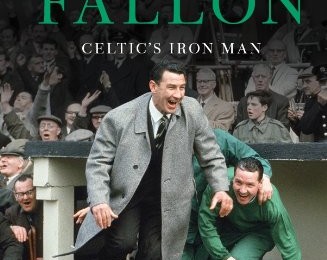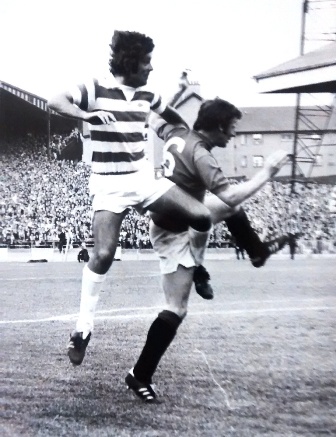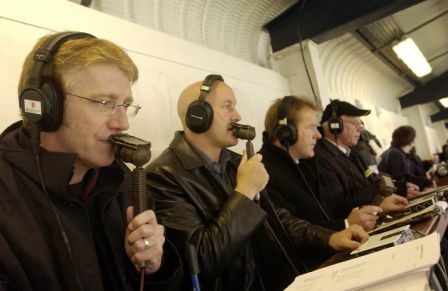Many years ago I recall some friends and I discussing the merits of Sean Fallon and we all harboured a great regret that Sean did not write a book and have his life story told in print. It may have taken a long while to come to fruition but Stephen Sullivan can be justly proud of his affectionate biography of one of Celtic’s greatest sons.
The good news is this book is not only well written but is also easy to read. The author paints the picture of each stage of Sean’s life and Sean then gives a passage of narrative to inform the reader in his own words. I don’t know if it’s just me but reading Sean’s narrative I couldn’t help but hear his voice in my own mind with that distinctive, gentle Sligo brogue we were all so familiar with.
The legendary stories of Sean’s life are all well told. Of how Jimmy McMenemy’s son saved Sean’s sister’s life in Lough Gill; the infamous clash with Rangers’ renowned hard man Sammy Baird; how Sean selected Jock Stein as Celtic captain and set Stein on the road to stardom; of how he persuaded Kenny Dalglish’s father to allow his son to sign for Celtic as his wife and family sat in the car in the street below; and of how Sean refused an enormous offer of £30,000 from the Sunday Mail in 1978 to dish the dirt on his days at Celtic.
These are all stories I was familiar with but it’s good to see them confirmed in detail and there is also plenty of material in the book which even the most ardent Celtic fan from the period will enjoy reading for the first time.
Growing up in his native Sligo, Sean Fallon believed it was his destiny to play for Celtic and he was able to realise that ambition. The early days of Sean’s life are revealed in great detail and he had an idyllic life in Sligo and it was a wretch for him to leave to advance his football career but he only persevered in the hope that one day Celtic would come calling.
A man of great faith, he held on to a deep conviction that he would achieve his ambition to play for the Celts. And when the chance came to go to Parkhead he was to grab the opportunity with both hands. He served Celtic tremendously as player and coach but it’s when he becomes assistant manager to Jock Stein that success comes to him. In droves.
This book also gives a remarkable insight into Jock Stein, both as a man and a manager as Sean, being his assistant, knew him best of all. Stein is painted as a hard task master but he also had a sensitive side to him but he always managed to avoid showing any emotion in front of his players as if it was a weakness to hide from them. The two men shared a close bond and eventually became near neighbours. Sean’s kids refer to Stein as ‘Uncle Jock’ and the families obviously still have a tremendous affection for each other.
When I was a boy my father would point to the Celtic bench with admiration. ‘See they guys there son ?….they are the most knowledgeable men in British football.’ And he was spot on. Stein couldn’t have wished for a more loyal and trustworthy team under him than Sean, Neilly Mochan, Bob Rooney and Jimmy Steele, all of whom are held in the highest regard by Celtic fans to this day. Although Stein was great manager he also had the best back room staff of that era.
Stephen Sullivan makes the comparison between Stein and Fallon’s relationship and that of Brian Clough and Peter Taylor. Perhaps a better example would have been to compare them to Bill Shankly and Bob Paisley at Liverpool. Shankly created the Anfield boot room and there’s no doubt a similar system operated at Parkhead during Stein‘s reign as Celtic manager.
Paisley replaced Shankly at Anfield in 1974 and went on to surpass anything that Shankly had achieved and had Jock Stein been seduced by the lure of Manchester United in 1971 then it would have been fascinating to consider if Sean would have taken over at Celtic and how successful he would have been as Celtic manager in his own right. Particularly as the ‘Quality Street Gang’ generation of young players were breaking through at that time and they had all been spotted and reared by Fallon.
By 1971 Celtic Park was the Camelot of Scottish football with Celtic reigning supreme in Scotland and also a tremendous force in European football. The villain of the peace then becomes new Celtic chairman Desmond White. Beforehand the old chairman, Sir Robert Kelly, had been revered by both Stein and Fallon. Celtic had resisted big offers from big English and continental clubs for their star players as Kelly sought to have Celtic continue to compete at the highest level. That ended with Kelly’s sad passing in September 1971 with Celtic being ‘in the unhealthy situation of having Desmond White as chairman, secretary and treasurer.’ The power within Parkhead had now switched from the manager to the chairman.
Fallon is typically gentle in his criticism of White but you can read between the lines. We are told that when Sean joined Celtic from Glenavon that he took a pay cut to join and when he joined Dumbarton after leaving Celtic he was placed on a higher salary at Boghead. As Stein and Fallon sought to consolidate their Parkhead empire, White seemed determined to dismantle it by allowing Macari, Hay and Dalglish to depart with indecent haste. Celtic should have been the team of the 70’s, competing with Ajax and Bayern Munich at the highest level. Instead by 1978 they were competing in the Anglo Scottish Cup. Fallon also remained convinced that Dalglish would have stayed with Celtic in 1977 had the financial conditions been right.
Sean Fallon’s departure from Celtic makes for painful reading. He was betrayed by the parsimonious Celtic board after having been promised a job for life and a testimonial by Desmond White. Despite the hurt he must have suffered he steadfastly refused to denigrate White or Celtic in his later years and Sean Fallon remained a true Celt to the very end. There is also the disappointment of discovering that Jock Stein did not fight to retain Sean’s services as his assistant when Stein must have known that it was his very own authority which was now being called into question upon Sean’s release from the club.
Fallon gives a harrowing account of the Ibrox disaster in 1971. He describes it as being like a scene from ‘Belsen’ and reveals that he saved the life of a young fan by giving him the kiss of life, something he had learned as a life guard in his native Sligo many years previously. He only revealed this story shortly before his death and had no wish to seek any publicity or acclamation for assisting in the most desperate of situations.
There are only two regrets that I have about this book. Firstly the wish that Sean had brought his story out years ago and secondly that he did not live to see this book published. The Celtic players loved Sean Fallon dearly, as did the supporters. In conversations older fans always referred to him simply and reverently as Sean and never by his surname.
This book is a tale well told, lovingly so, about the most hard working, humble and modest man who ever served Celtic and their supporters. It is thoroughly recommended. Every Celtic household should have a copy.






Sean Fallon was my late father’s favourite Celtic player, and one of his heroes. My dad didn’t do heroes, “they don’t pay your wages” he used to say, but Sean was different, the mention of his name was enough to turn him back into a wee boy with pictures on his wall, and a Celtic scarf hanging out of his school bag.
Now having read this marvellous and poignant first book by Stephen Sullivan I fully understand why.
Footballers’ life stories now are full of salacious gossip and nonsense about how they had always wanted to play for Club A/Club B/Club C/whoever offered them the biggest signing on fee, and more often than not are written by ghost-writers who have to spoon feed the words into these spoilt heroes’ mouths.
Not this book. The biggest compliment I can pay to Stephen is to say that I felt I was sat in that room next to Sean on the sofa as he took us throughs the highs and lows of his life with Celtic.
The 7-1 game and Lisbon are two of the finest moments in Celtic’s illustrious history, and, in this regard, the book does not disappoint in revisiting stories that most Celtic fans may have heard before, but with a new slant. The best parts though are the stories we haven’t heard, about Sean’s amazing eye for talent, his bravery and his over riding modesty.
Sean Fallon. A man who was as important in the history of Celtic as any other.
I get it now Dad.